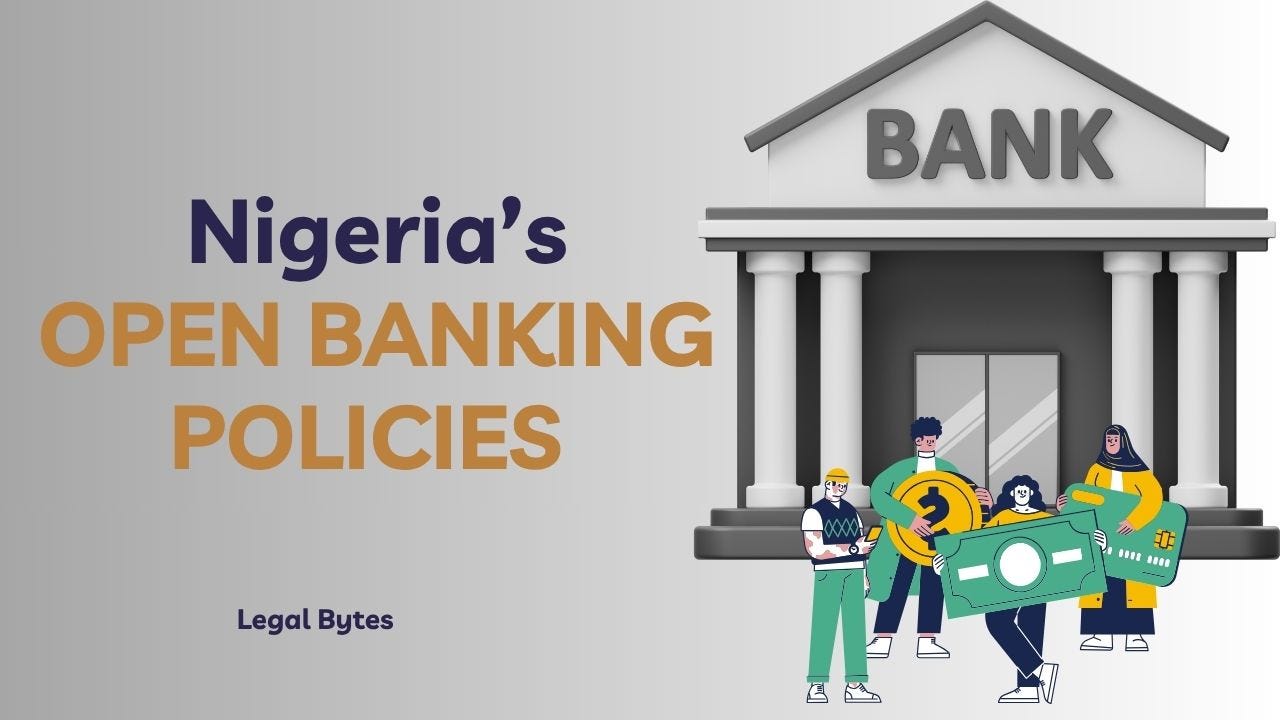CBN's OPEN BANKING FRAMEWORK: What it meanS for Fintechs and Consumers?
Understanding Nigeria’s open banking policies, their legal foundation, and how they’re reshaping data sharing in the financial services space
On March 7, 2023, the Central Bank of Nigeria (CBN) took a major step toward reshaping the Nigerian financial landscape by releasing its long-anticipated Open Banking Guidelines.
Formally approved on March 30, 2023, these guidelines are designed to encourage innovation, enhance the customer experience, and foster a more inclusive, secure, and competitive financial services environment.
So what exactly is open banking, and why should fintechs, banks, lawyers, and consumers care?
What Is Open Banking?
Open banking is a system that allows licensed third-party providers (such as fintech companies or retail platforms) to access a customer’s banking data, but only with the customer’s consent.
This creates a tripartite relationship between:
The bank (which holds the data),
The customer (who owns the data), and
The third-party provider (which uses the data for specific services).
Access is granted through secure, standardized technology called APIs (Application Programming Interfaces), making it easier for fintechs to offer personalized services, such as budgeting tools, loan comparisons, investment insights, and more, all built on real-time, consent-driven data.
What Is the Legal Basis for Open Banking in Nigeria?
The CBN Open Banking Guidelines were issued to:
Promote competition and financial inclusion,
Enhance data security and system stability,
Clarify the responsibilities of all participants
Protect the rights of customers, and
Ensure a standardized approach across Nigeria’s banking and fintech sector.
The guidelines are supported by 12 core sections and five appendices detailing operational, legal, and technical expectations.
They apply to:
Banks
Other financial institutions (OFIs)
Fintechs, payment service providers, and data processors
Retailers and third-party service providers
Customers whose consent is central to every transaction
Key Participants in the Open Banking Framework
1. API Provider (AP):
Entities (usually banks or financial service providers) that provide APIs (Application Programming Interfaces) to make customer data or services available. Other examples of API Providers include licensed fintechs, payroll processors, and Fast-Moving Consumer Goods (FMCG) platforms.
2. API Consumer (AC):
Entities that use APIs provided by others to access customer data or offer services. Examples of API Consumers include Fintech apps that pull bank data to deliver credit scores, budgeting tools, or payment insights.
3. Customer:
The owner of the data, who must give explicit consent before any data is shared or a financial service accessed.
The Open Banking Registry (OBR)
To keep things organized, the CBN also created the Open Banking Registry (OBR), a centralized database where all open banking participants must register and be verified. This enhances accountability, transparency, and legal oversight, ensuring that only trusted actors operate in the ecosystem.
What Open Banking Means for Fintechs in Nigeria
Open banking is a game-changer for Nigerian fintechs, unlocking several opportunities:
1. Faster Innovation & Expansion
Fintechs can now build smarter, faster, and more targeted solutions using real-time banking data, with customer consent. This reduces reliance on outdated manual processes or guesswork.
2. Better Partnerships with Banks
Open banking formalizes collaboration between traditional banks and agile fintech startups. It removes friction and enables the co-creation of services like BNPL (Buy Now, Pay Later), wealth management, and lending.
3. Legal Clarity & Confidence
The framework gives fintechs legal assurance to request customer data securely, avoiding data privacy violations, black-market data practices, or legal grey areas.
4. Improved Customer Service Delivery
With access to accurate financial data, fintechs can tailor their offerings to individual users, improving user experience and service reliability.
What Open Banking Means for Consumers
The customer is at the center of the open banking model. Here’s how consumers benefit:
1. Full Control Over Personal Data
Customers decide if, when, and with whom they share their financial data. No more silent tracking or data use without permission.
2. Better, Personalized Financial Services
With consented data sharing, customers can enjoy tailored financial services — from budgeting help to automatic savings plans, loan offers, or even bill tracking — all in one dashboard.
3. Increased Privacy and Security
Data is shared only when customers authorize it, using two-factor authentication and electronic signatures. The guidelines also forbid the misuse of data, and cybersecurity safeguards are mandatory.
Customer Protection Principles Under the Guidelines
The Open Banking Guidelines clearly outline key customer experience standards that all participants must adhere to:
Control: Customers must be empowered to view, manage, and revoke consent for data sharing at any time. They should have the tools and clarity to make informed choices about their financial data.
Speed: Interactions within the open banking system must be efficient and seamless, ensuring that speed does not come at the expense of security or user control.
Transparency: Participants are required to communicate in plain, understandable language. Customers must be informed about what data is being collected, the purpose of the collection, and the possible implications of giving consent.
Security: All parties involved must guarantee data protection, explaining how user data is defined, used, stored, and safeguarded. Security isn’t optional — it’s a core legal and technical obligation.
These standards are non-negotiable and a significant step forward for user rights, digital trust, and legal accountability in Nigeria’s financial sector.
Conclusion: A Legal and Commercial Milestone for Nigeria
The CBN’s Open Banking Guidelines mark a significant evolution in Nigeria’s financial ecosystem. They lay the legal groundwork for a more competitive, secure, and data-driven market and promote stronger partnerships between banks, fintechs, and customers.
By embracing open banking, Nigeria is not only keeping pace with global financial innovation but also affirming consumer data rights and privacy protections in line with the NDPA 2023 and international best practices.
Final Word for Fintechs, Founders, and Legal Advisors
Whether you’re building a lending app, budgeting tool, or digital wallet, or you advise a startup entering the financial space, now is the time to get familiar with the Open Banking Guidelines. Ensure your platform is:
Properly registered with the Open Banking Registry,
Implementing user consent systems,
Compliant with API security standards, and
Transparent in all data-sharing activities.
Need help reviewing your API agreements, customer consent flows, or platform compliance? Let’s talk. I help fintechs, platforms, and tech-focused lawyers navigate emerging Nigerian laws with clarity and confidence.
About Legal Bytes
We are Adune Legal’s weekly Newsletter, which simplifies the Law for Busy Executives, Entrepreneurs, and Tech Enthusiasts interested in the legal aspects of Business, Technology, and Intellectual Property.
We love emails from our readers— reply to this email and let us know your thoughts and suggestions.
WAIT!!!
Become a paid subscriber and access;
Q&A sessions with Nneoma Grace via chats on Substack.
Detailed Legal Templates and examples to save you time and legal fees
Expert Interviews and Case Studies
Don't miss out on these perks - subscribe today and start enjoying it!
Thanks for reading Legal Bytes
Adune Legal’s Team
P.S. Like Legal Bytes? Please forward us to a friend.
P.P.S. Was this publication forwarded to you? Sign up here & see previous publications.





